Salesforce Salary Negotiation: How to Negotiate a Salesforce Job Offer
Securing a job offer at a fast-growing tech company like Salesforce can be tough, so we understand why you might be hesitant to negotiate your compensation package before accepting. However, giving into that hesitation could mean leaving money on the table since Salesforce is willing to negotiate job offers. How do we know? Because our clients have used our tried-and-true negotiation strategy to receive more compensation for their Salesforce jobs.
Since Salesforce is a top tech employer in San Francisco, you might assume that salary negotiation with them is almost impossible; however, it’s actually a simple and straightforward process. Even though Salesforce may not be known for the highest salaries in the tech industry, the benefits and perks they offer are similar to other tech companies. In fact, you’ll find that their compensation for software engineers, data scientists, product managers, and many business-based roles still remain competitive.
In this article, we will outline and explain our key salary negotiation tips that can help you negotiate a Salesforce job offer confidently, allowing you to receive the compensation you deserve.
Want to Negotiate Your Offer? Get offer-specific guidance from a Salary Negotiation Coach. We help career professionals negotiate competitive job offers.
Or leverage our Salary Negotiation Courses and Salary Negotiation Templates.
 Job Offer Negotiation Course
Job Offer Negotiation Course
- Get our job offer negotiation strategies, templates, scripts, and guidance.
- Access our step-by-step lessons, compensation research guides, and tools.
- Access Now
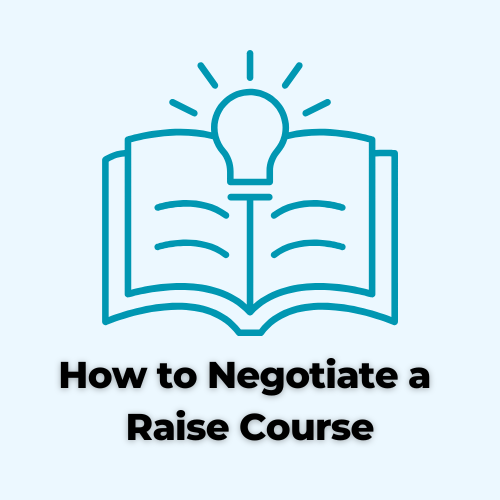 Raise Negotiation Course
Raise Negotiation Course
- Get our raise negotiation strategies, templates, scripts, and guidance.
- Access our step-by-step lessons, compensation research guides, and tools.
- Access Now
Understanding the Compensation Components of a Salesforce Job Offer
Compared to competing tech companies, Salesforce’s benefits and compensation are similar yet have a few important differences. If you want to set yourself up for success in the negotiation process, you’ll need to understand the ins and outs of these pay components first. Understanding how each of these Salesforce salary components work will give you the opportunity to negotiate as many of them as possible while also helping you calculate your total compensation accurately—in other words, your total annual take home pay.
When most people think about job offers, they typically just think about the base salary being offered. However, a Salesforce compensation package includes much more than that. Salesforce provides a performance bonus, initial equity grant, a sign-on bonus, and many other valuable benefits. Here’s an example of what a Salesforce Senior Software Engineer (Senior MTS) total compensation may look like in their initial offer:
Salesforce Software Engineer Salary
Now, let’s take a closer look at these different compensation components.
Salesforce Base Salary
Your base salary is the first component of your Salesforce job offer. A base salary is the guaranteed fixed pay you receive for the work you do. Unless you receive merit increases or a promotion, your base salary will never change.
For most companies, including Salesforce, every job role has a specific salary range associated with it with set minimum and maximum amounts. Take a Salesforce software engineer role for example. The base salary pay range for this role would differ from that of a product manager or data analyst.
Understanding how these pay bands work is essential since the Salesforce base salary you will receive in your initial offer will probably not be at the upper end of that range—which is why you’ll need to know how to negotiate it higher.
Salesforce Yearly Performance Bonus
Another component of your Salesforce compensation package will be your yearly performance bonus. Salesforce provides an annual target bonus, which is a percentage of your base salary and is based on both personal and company performance. Fortunately, Salesforce has performed well in years past, so the company performance portion of the yearly bonus has delivered a consistent payout historically.
The target percentage for your performance bonus will range depending on your role type and level. To ensure you can calculate your total compensation correctly, it is important to clarify with the recruiter what the expected percentage would be for your position.
Technically, this aspect of your compensation package is not negotiable; however, it is directly dependent on your base salary. This means, then, that if you’re able to successfully negotiate your Salesforce base salary higher, your Salesforce performance bonus will increase with it.
Salesforce Initial Equity Package
A significant component of a Salesforce job offer is the equity package—and it’s fully negotiable. In fact, this is where our clients have made some of the biggest improvements in their compensation packages when we guided them through their salary negotiation with Salesforce.
New employees will receive an initial equity grant in their job offers, which comes in the form of restricted stock units (RSUs). These RSUs represent actual ownership of stock (i.e., you will receive shares of CRM stock) that will be transferred to you when the stock vest according to the Salesforce RSU vesting schedule.
Salesforce’s RSUs have a four-year vesting schedule with an initial one-year cliff, which means you’ll get your initial stock vest (25%) at the end of your first year and then your RSUs will vest quarterly over the remaining three years.
Salesforce RSU Vesting Schedule
| Company | Vesting Period | Year 1 | Year 2 | Year 3 | Year 4 |
|---|---|---|---|---|---|
| Salesforce | 4 years (equal) | 25% | 25% | 25% | 25% |
This is a different vesting schedule compared to Apple, who doesn’t have a one-year cliff.
Here’s something important to remember: Even though Salesforce’s RSUs can be an extremely valuable form of compensation, if you leave Salesforce before the stock vests, you’ll forgo that equity. This is where the term “Golden Handcuffs” comes from—it’s difficult to leave because the equity increases over your tenure and the opportunity cost for leaving increases as well.
Salesforce Sign-On Bonus
Most companies offer sign-on bonuses as an incentive to join and to cover any lost bonuses or unvested equity that you might lose at your current company. However, Salesforce has pulled back on offering these bonuses so you typically have to negotiate with them to receive one. The good news is our clients have had success securing Salesforce signing bonuses and we believe they’re a benefit worth asking for multiple times.
The Salesforce sign-on bonus is paid in a lump sum at the beginning of your first year of employment, but if you leave the company before the end of that year, you have to pay it back. However, don’t let that caveat deter you from negotiating this benefit.
Salesforce Equity Refresher
A major factor at Salesforce that differentiates it from competing tech companies is that equity refreshers (more stock) is not guaranteed and is historically only provided to top performers. This is an important topic to raise with the recruiter to ensure you understand your eligibility for this component. We don’t include this factor in our total compensation calculation because the unknowns of the Salesforce equity refresher make it hard to compare across offers.
Benefits and Perks at Salesforce
You’ll find market leading benefits and perks at Salesforce which include health, Salesforce 401k, and other core benefits that you’d expect from a well-established and top tech company. Their most notable perk (and the one that makes them stand apart from other large tech companies) is the Salesforce Flexible Time Off (FTO) policy—which is unlimited vacation time. This is a perk that is usually found at smaller companies but Salesforce has been able to adopt it for its large swath of salaried employees. On top of this, they even have a Volunteer Time Off policy where you can be awarded for supporting your community.
Salesforce benefits and perks are usually non-negotiable but it’s still a good idea to poke at them when completing your due diligence on the offer.
Five Key Steps to Negotiate a Salesforce Job Offer
Negotiating a Salesforce job offer requires a slightly different approach than how you might negotiate a Meta job offer or negotiate a Google job offer. It’s essential that you understand the ins and outs of this approach before you start negotiating.
The most important thing to remember is that you should never start the negotiation process until you have an offer in hand. Salesforce is known to pry about your salary expectations and you don’t want to jeopardize your chances of receiving a strong job offer by negotiating too early. You’ll always have more leverage once the hiring team has selected you as the ideal candidate for the role and has shared an offer with you.
Over the years, we have worked with hundreds of clients on their salary negotiations. Based on this experience, we have identified five keys steps which we have listed below that will help you navigate your Salesforce salary negotiation. While these are the key steps to a Salesforce salary negotiation, we strongly recommend you work with a Salesforce Salary Negotiation Coach to ensure success in your Salesforce offer negotiation by getting all of our strategies.
1) Understand the Components of Your Salesforce Job Offer
This first step should be easy since we’ve already covered it. As a refresher, make sure that you understand the total compensation of your Salesforce job offer before trying to negotiate your salary. If you have specific questions about the different components of your job offer, feel free to reach out to our team.
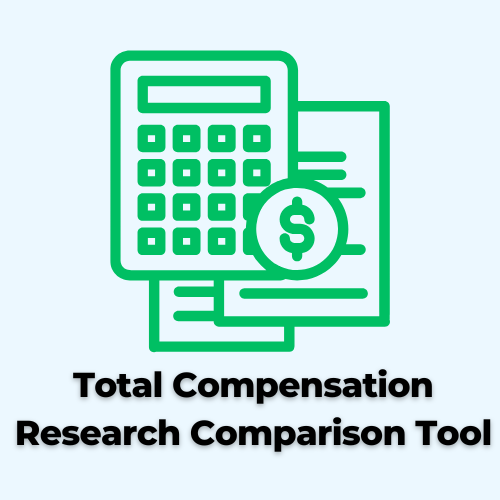
- Understand Total Compensation – Use our tool to break down and calculate the compensation in your job offer.
- Research & Compare Offers – Organize your compensation research and determine the right counter amount.
- Get Here
2) Complete Due Diligence on Your Salesforce Job Offer by Asking the Right Questions
If there’s one piece of advice you should take away from this article, it’s this: make sure you understand your offer before you start negotiating and especially before accepting. One of the best ways to do this is by asking thoughtful and strategic questions. Asking smart questions communicates to the recruiting team that you value the offer and are taking the process seriously—while also giving you the opportunity to gather the facts needed to craft an effective Salesforce counteroffer and ultimately improve your compensation.
Even if you think you already know the answers, ask them anyway! It never hurts to confirm and you can use our list of Strategic Questions to Build Negotiation Leverage if you need help finding the right questions to ask.
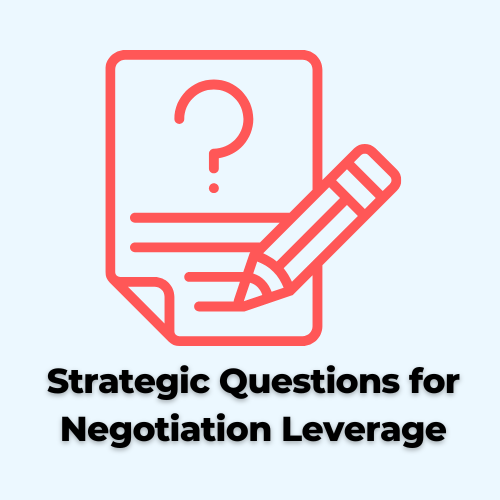
- Build Negotiation Leverage – Ask the right questions to strengthen your negotiation before sending a counter.
- Email & Phone Scripts – Get our list of questions to ask and what to say if the recruiter wants to chat through them.
- Get Here
While it’s normal to ask for more time to process an offer, our clients have had greater success negotiating Salesforce job offers when they start asking questions right after receiving their initial offer. Doing so shows the recruiter you’re actively interested in understanding and pursuing the role.
3) Research the Compensation Ranges to Identify What Your Compensation Should Look Like
It goes without saying that tech companies are known for using data to make decisions—and Salesforce is no exception. That’s why it’s important to gather compensation data to understand your role’s pay range, the strength of your offer, and how much you should ask for based on your specific role and its location.
PayScale and Glassdoor can provide helpful data on salaries and other compensation components, but keep in mind that these publicly recorded pay ranges may not accurately reflect all compensation components, especially given changes in compensation from year to year. You can use our Total Compensation Research Comparison Tool to help you with your Salesforce compensation research.

- Understand Total Compensation – Use our tool to break down and calculate the compensation in your job offer.
- Research & Compare Offers – Organize your compensation research and determine the right counter amount.
- Get Here
A general rule of thumb (and what we recommend) is to push for the mid-to-top-end of the total compensation range—regardless of your experience or background.
4) Send a Salesforce Counteroffer to the Recruiter
Once you’ve finished prepping for the negotiation (the first three steps), you should be ready to send over a Salesforce salary negotiation counter. This is an exciting step where you get to advocate for yourself and highlight why you’re an asset to the team.
To start this negotiation process, you’ll respectfully present your Salesforce counteroffer to the recruiter by referencing your research findings and articulating how the benefits differ from other companies and/or your current role. While you could do this via phone, we strongly suggest counteroffering over email so you have everything in writing. Having everything in writing also better ensures that the recruiter shares your Salesforce counteroffer with the hiring team accurately. When you present your counteroffer, be firm while also being professional and courteous. Check out our Counteroffer Examples for email drafts if you need help formulating a strong Salesforce counteroffer.

- Proven Counteroffer Templates – Built from hundreds of successful job offer negotiations.
- Negotiate with Confidence – Remove the guesswork with our professionally crafted counteroffers.
- Get Here
Remember: you’re not an employee yet and you want to set a gracious example for how you’d act once officially hired.
5) Handle Any Objections From the Recruiter and Accept Knowing You Achieved the Best Offer
In some cases, all it takes is a single counteroffer for the recruiter to come back with an updated Salesforce offer. However, it’s more likely that the recruiter will come back with excuses for why the hiring team cannot make any adjustments to the offer. If that happens, it’s important to see their “NO” as an objection you need to overcome instead of a “NO” that you can’t push back on.
If they do come back with a “no” to your Salesforce counteroffer, respond by respectfully acknowledging their limitations, but reiterate your ask and your desire for them to share your thoughts with the team (even if they say that their team will just say no). You should follow this approach regardless of the recruiter’s reasoning—so be prepared to face a few objections and follow our Objection Handling Scripts to do this correctly. Once they agree to take it back to their team, they should come back with a better offer.
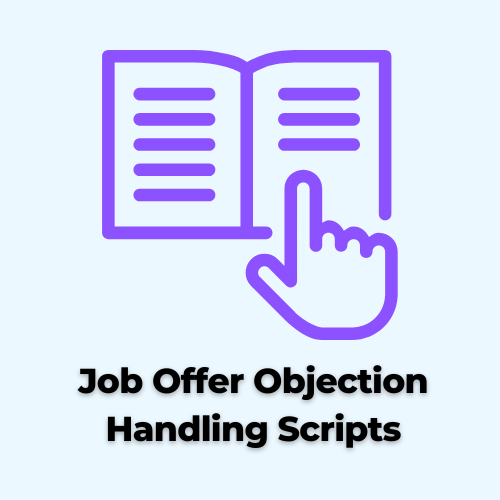
- Overcome Recruiter Pushback – Proven scripts to handle pushback and keep your salary negotiation on track.
- Communicate Effectively – Use expert responses to get recruiters to advocate for you with the compensation team.
- Get Here
Once you receive an updated offer that aligns with your personal needs and the pay bands you researched, you should be ready to send an offer acceptance email and lock in your negotiated offer with Salesforce. Congratulations on successfully navigating this process!
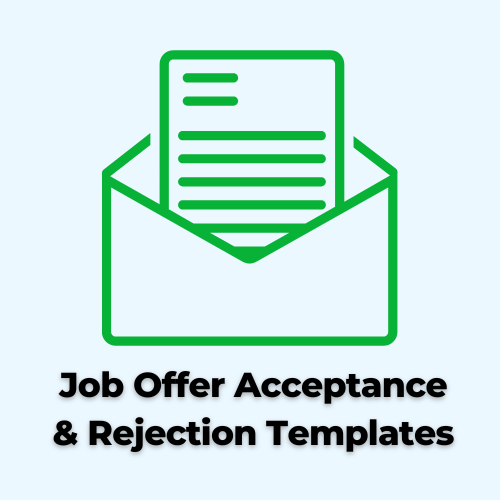
- Accept or Decline – Expert crafted job offer acceptance email and rejection email templates to share your decision.
- Professional & Genuine Tone – These help you communicate in a professional manner regardless of what you decide.
- Get Here
Mistakes to Avoid During your Salesforce Salary Negotiation
During your Salesforce salary negotiation, there are a few key mistakes to make sure you avoid so that you can secure the best offer. We’ve outlined some of these top mistakes below.
Avoid Sharing Salary Expectations Before You Get a Job Offer at Salesforce
In our experience negotiating Salesforce job offers, Salesforce recruiters will work hard to find out your salary expectations before providing you with an offer. However, you should keep that information to yourself since sharing your salary expectations can actually make it more difficult to receive a fair offer. Using our Salary Expectations Scripts can help you avoid giving in to the recruiter’s questioning. Salesforce recruiters might even tell you that knowing your salary expectations can help them find the best deal for both you and their team. It sounds like a logical request, but remember that they’re working for Salesforce, not you.
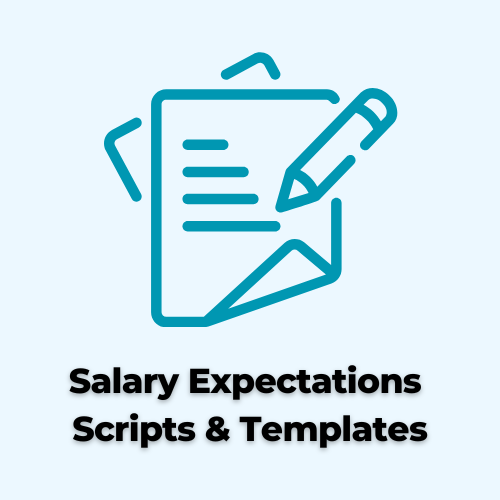
- Salary Expectation Responses – Scripts to overcome recruiter salary expectation discussions and pre offer calls.
- Avoid Lowballing Yourself – These call scripts and email templates will help you get a competitive offer.
- Get Here
Here’s how this might work in practice: if you share a lower compensation expectation with the recruiter than what they could offer, they are more likely to offer you that lower compensation. Alternatively, if you name a number higher than what they can offer, there is a chance that they could become disinterested and decide to go with a different candidate. Additionally, it doesn’t make sense to discuss your compensation before you learn more about the specific role and the benefits Salesforce can offer you.
Don't Be Afraid to Negotiate a Salesforce Job Offer
Many people forgo negotiating a Salesforce job offer out of fear of losing the offer. However, there’s no need to have this fear; we’ve helped facilitate hundreds of successful Salesforce salary negotiations and we’ve never seen Salesforce pull a job offer because a candidate tried to negotiate. It's generally expected, regardless of the role level—whether it’s an individual contributor, Salesforce manager salary, Salesforce director salary, or a Salesforce vp salary—you should negotiate your salary. Don’t let salary negotiation myths keep you from advocating for what you deserve.
Be Realistic by Doing Your Research
Even though Salesforce pays extremely well, you don’t want to push for compensation that isn’t reasonable. Understanding each aspect of your total compensation package at Salesforce and researching the pay bands of your specific role will help you know what compensation is appropriate.
Salesforce Salary Negotiation Coaching & Tools
Increasing your PayPal compensation requires a deep understanding of the company’s compensation philosophy and the right salary negotiation strategy. Our expert Salary Negotiation Coaching will help you navigate the PayPal salary negotiation process and secure the top end of the pay band.
Or leverage our Salary Negotiation Courses and Salary Negotiation Scripts.
 Job Offer Negotiation Course
Job Offer Negotiation Course
- Get our job offer negotiation strategies, templates, scripts, and guidance.
- Access our step-by-step lessons, compensation research guides, and tools.
- Access Now
 Raise Negotiation Course
Raise Negotiation Course
- Get our raise negotiation strategies, templates, scripts, and guidance.
- Access our step-by-step lessons, compensation research guides, and tools.
- Access Now



